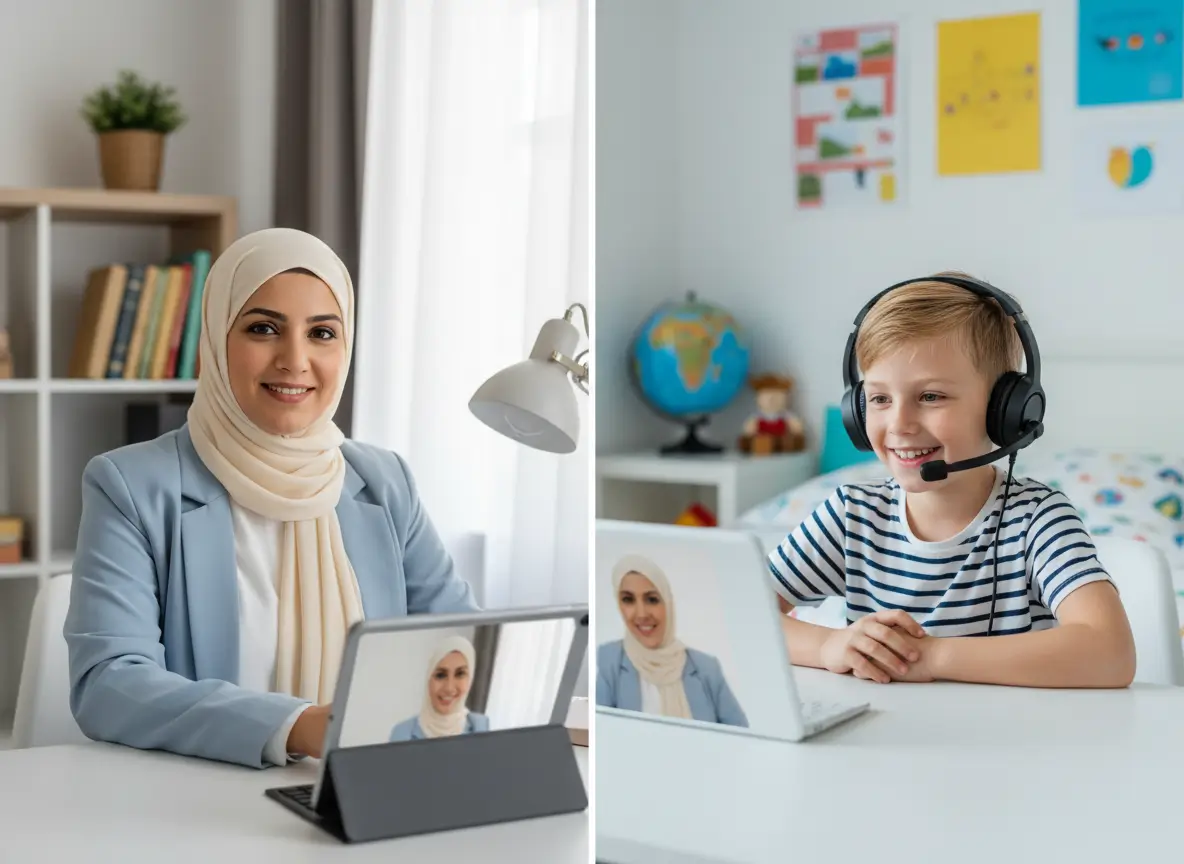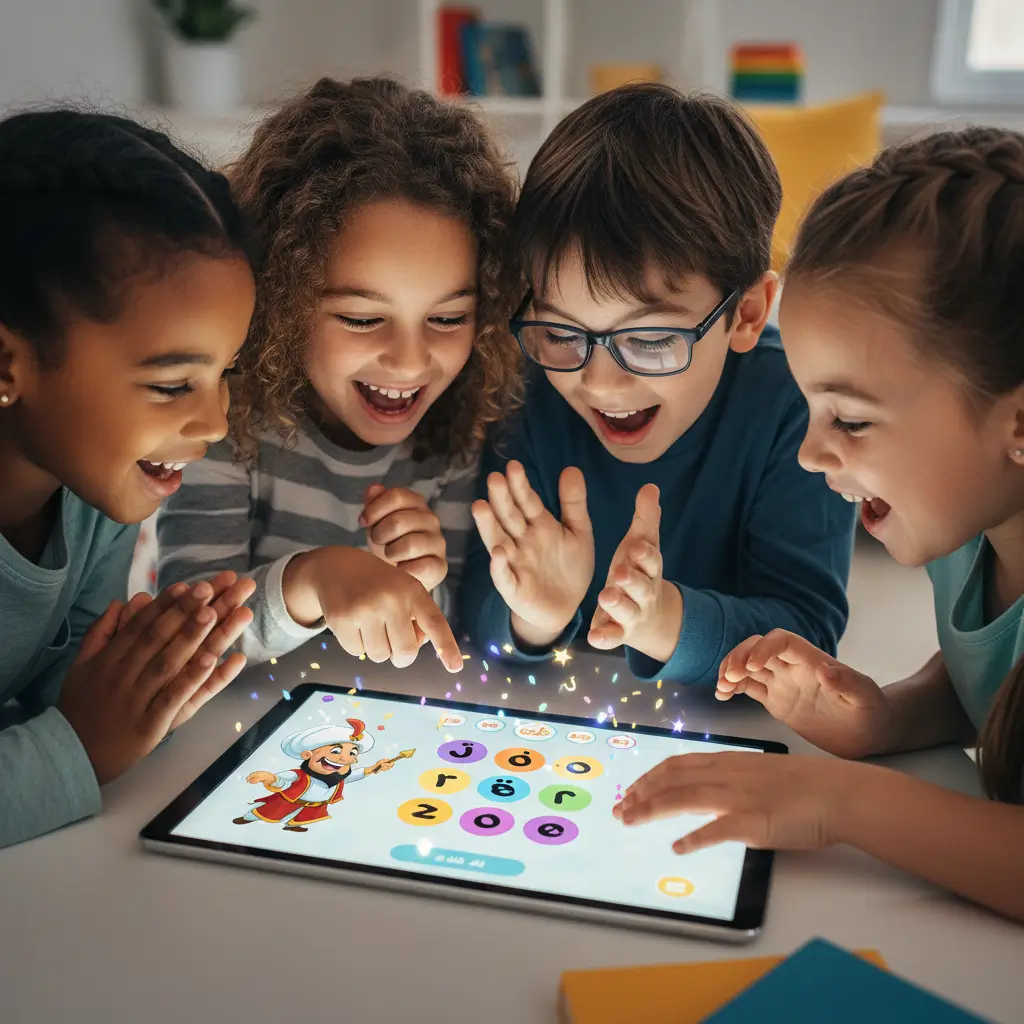
Introduction: When a Child Discovers Their Heritage Through Language
Arabic for Kids best story .Seven-year-old Layla sat at her grandmother’s kitchen table in Michigan, watching Teta knead dough for ma’amoul cookies. Teta spoke to her in flowing Arabic—warm, melodic, full of love. But Layla understood nothing.
“Teta, I don’t know what you’re saying,” Layla said, her eyes welling with tears.
Her grandmother’s face fell. For the first time, the language barrier between them felt like a wall. Teta had stories to tell—about growing up in Lebanon, about Layla’s great-grandfather, about family traditions spanning generations. But Layla couldn’t understand any of it.
That night, Layla’s mother Sarah made a decision that would transform their family. She enrolled Layla in an online Arabic program designed specifically for children—one that combined qualified native-speaking teachers, interactive games, cultural storytelling, and age-appropriate pedagogy.
Eighteen months later, Layla sat at the same kitchen table. Teta spoke in Arabic about making kahk for Eid. This time, Layla responded—in Arabic. She asked questions about the recipe, shared stories from school, and laughed at Teta’s jokes. The wall had disappeared.
“Learning Arabic didn’t just give Layla a language,” Sarah reflected. “It gave her access to her grandmother’s heart, to her cultural identity, and to an entire world she’d been locked out of. That’s what Arabic for kids really means—it’s not just vocabulary and grammar. It’s connection, belonging, and heritage.”
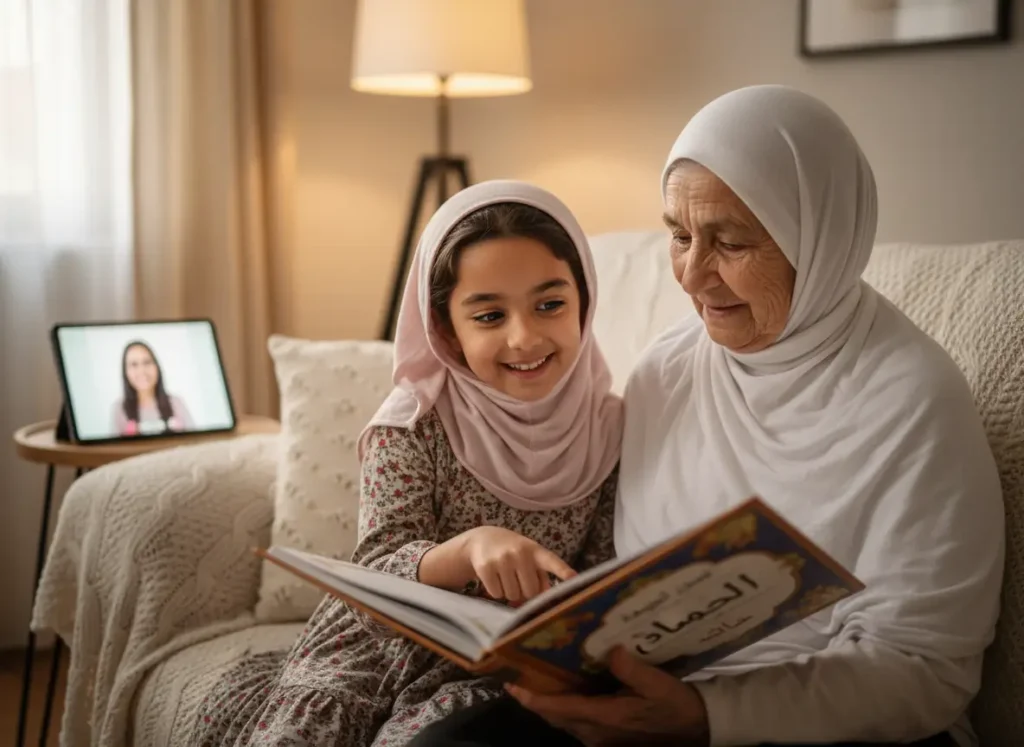
This is the transformative power of effective Arabic education for children. When done right—with qualified teachers, research-backed methods, engaging materials, and cultural integration—learning Arabic becomes more than academic achievement. It becomes identity affirmation, cognitive enhancement, and family connection.
This comprehensive guide synthesizes current research in second language acquisition, child development psychology, and pedagogical best practices to provide parents, educators, and families with evidence-based strategies for teaching Arabic to children. Whether your child is a heritage speaker reconnecting with roots, a non-Arab Muslim learning the language of the Quran, or simply a curious learner exploring linguistic diversity—this guide illuminates the path to Arabic proficiency.
Why Arabic for Kids Matters: Scientific and Cultural Foundations
The Cognitive Benefits: What Research Reveals
Contemporary neuroscience and psycholinguistic research provide compelling evidence for early language learning’s profound cognitive benefits.
Enhanced Executive Function: Bilingual children demonstrate superior executive function—the cognitive processes governing attention control, working memory, and cognitive flexibility (Bialystok & Martin, 2004). Learning Arabic alongside a first language strengthens these neural pathways, creating measurable advantages in:
- Inhibitory Control: The ability to suppress irrelevant information
- Task Switching: Flexibility in shifting between different activities
- Working Memory: Capacity to hold and manipulate information
Metalinguistic Awareness: Children learning Arabic develop heightened metalinguistic awareness—the ability to think about language as an object of analysis (Bialystok, 2001). This manifests as:
- Enhanced phonological awareness (crucial for reading acquisition)
- Superior grammatical intuitions
- Greater understanding of language structure and function
- Improved analytical thinking about communication
Cognitive Reserve and Neural Plasticity: Early bilingualism creates cognitive reserve—a protective factor against cognitive decline in later life (Bak et al., 2014). Children learning Arabic literally build denser neural networks, establishing foundations for lifelong cognitive health.
The Critical Period Advantage: While language acquisition remains possible throughout life, the “critical period hypothesis” (Lenneberg, 1967; subsequently refined by numerous researchers) suggests optimal windows for different linguistic components:
- Phonological Acquisition: Before age 7 (native-like pronunciation most achievable)
- Morphosyntactic Development: Before puberty (intuitive grammar internalization)
- Lexical Learning: Lifelong capacity (though learning strategies differ)
Children beginning Arabic before age 10 typically achieve higher ultimate attainment in pronunciation and intuitive grammatical competence than adult learners (Abrahamsson & Hyltenstam, 2009).
The Cultural Imperative: Identity and Belonging

Beyond cognitive advantages, Arabic learning fulfills profound cultural and psychological needs for many children.
Heritage Language Maintenance: For children of Arab heritage, Arabic is identity. Research demonstrates that heritage language proficiency correlates with:
- Stronger ethnic identity formation (Phinney et al., 2001)
- Enhanced self-esteem particularly during adolescence
- Deeper family relationships especially with monolingual grandparents
- Cultural pride and community connection
Islamic Education: For Muslim children globally, Arabic provides direct access to the Quran, Hadith, and Islamic scholarship. Religious literacy in the original language deepens spiritual understanding and religious practice.
Global Citizenship: Arabic is spoken by 400+ million people across 25+ countries. Children learning Arabic gain:
- Access to one of the world’s major linguistic communities
- Career advantages in international relations, business, and diplomacy
- Cultural competence in an increasingly interconnected world
Developmental Stages: Age-Appropriate Arabic Learning (3-16 Years)
Effective Arabic instruction must align with children’s cognitive, social, and emotional development. Research in developmental psychology (Piaget, 1952; Vygotsky, 1978; contemporary extensions) informs age-appropriate pedagogical approaches.
Early Childhood (Ages 3-5): The Foundation Phase
Cognitive Characteristics:
- Concrete operational thinking (learning through sensory experience)
- Short attention span (5-10 minutes for focused activity)
- Egocentric perspective gradually developing into social awareness
- Language acquisition through natural immersion and repetition
Optimal Arabic Learning Approaches:
- Total Physical Response (TPR): Children learn vocabulary through movement (Asher, 1969). “Jump” (qfiz – اقفز), “sit” (ajlis – اجلس), “clap” (ṣaffiq – صفق) taught through physical action
- Songs and Rhymes: Leveraging musical memory and prosodic patterns for vocabulary and pronunciation acquisition
- Storytelling with Visual Aids: Picture books, puppets, and props supporting comprehension and engagement
- Play-Based Learning: Arabic integrated into pretend play, building blocks, and social games
- Native Speaker Models: Exposure to native Arabic speakers (teachers, recorded media) for phonological development
Realistic Outcomes (18-24 months):
- Recognition and production of 200-300 common words
- Basic conversational phrases (greetings, requests, simple descriptions)
- Foundational phonological awareness (Arabic sounds)
- Positive association with Arabic language and Arab/Islamic culture
Middle Childhood (Ages 6-10): The Building Phase
Cognitive Characteristics:
- Concrete operational thinking maturing (Piaget)
- Developing metacognitive awareness (thinking about thinking)
- Increasing attention span (20-30 minutes)
- Peer relationships becoming significant
- Rule-based learning emerging
Optimal Arabic Learning Approaches:
- Structured Literacy Instruction: Systematic phonics-based approach to Arabic reading and writing (especially important given Arabic’s non-Latin script)
- Communicative Language Teaching: Focus on meaningful interaction over rote memorization
- Content-Based Instruction: Learning Arabic through subjects (stories, science, culture) rather than isolated grammar drills
- Gamification: Points, levels, achievements leveraging children’s intrinsic motivation
- Peer Interaction: Small group classes fostering social learning and collaborative practice
Realistic Outcomes (2-3 years consistent study):
- Reading and writing fluency in Arabic script
- Productive vocabulary of 1,000-1,500 words
- Basic conversational competence (describe experiences, express needs, understand stories)
- Elementary grammatical intuitions (gender, number, basic verb conjugations)
- Cultural knowledge (holidays, customs, geography)
Adolescence (Ages 11-16): The Mastery Phase
Cognitive Characteristics:
- Abstract operational thinking (Piaget)
- Developing formal logic and analytical reasoning
- Identity formation intensifying (Erikson’s identity vs. role confusion)
- Peer influence paramount
- Metacognitive strategies maturing
Optimal Arabic Learning Approaches:
- Academic Arabic Development: Moving beyond conversational Arabic to reading authentic texts (literature, news, Quran)
- Explicit Grammar Instruction: Adolescents benefit from understanding grammatical rules explicitly (unlike younger children who acquire implicitly)
- Task-Based Learning: Real-world tasks (write essay, give presentation, debate topic) as learning vehicles
- Technology Integration: Apps, online resources, social media in Arabic
- Cultural Deep Dives: Exploring Arab history, literature, contemporary issues
Realistic Outcomes (3-5 years advanced study):
- Advanced literacy (reading novels, news, religious texts)
- Productive vocabulary of 3,000-5,000 words
- Conversational fluency across diverse contexts
- Grammatical mastery sufficient for formal writing
- Bicultural competence and sophisticated cultural understanding
Pedagogical Approaches: Research-Backed Teaching Methods
Effective Arabic instruction for children synthesizes multiple evidence-based pedagogical frameworks.
Communicative Language Teaching (CLT)
Theoretical Foundation: CLT emerged from research demonstrating that language acquisition occurs through meaningful communication, not mechanical drills (Hymes, 1972; Canale & Swain, 1980).
Application to Arabic for Kids:
- Meaning Before Form: Children learn “كيف حالك؟” (How are you?) as a social interaction before analyzing grammatical components
- Authentic Communication: Role-plays, information gap activities, real-world tasks
- Error Tolerance: Mistakes viewed as developmental stages, not failures requiring immediate correction
- Functional Language Use: Language taught for actual communication purposes relevant to children’s lives
Natural Approach and Comprehensible Input
Theoretical Foundation: Krashen’s Input Hypothesis (1982) posits that language acquisition occurs when learners receive comprehensible input slightly above their current level (i+1).
Application to Arabic for Kids:
- Rich Input Environment: Abundant exposure to spoken and written Arabic at appropriate levels
- Visual and Contextual Support: Pictures, gestures, props making meaning accessible
- Low-Anxiety Atmosphere: “Affective filter” kept low through encouragement and acceptance
- Focus on Message Over Form: Comprehension emphasized before production demands
Task-Based Language Teaching (TBLT)
Theoretical Foundation: TBLT (Long, 1985; Willis, 1996) structures learning around meaningful tasks requiring language use for completion.
Application to Arabic for Kids:
- Age-Appropriate Tasks: “Create a menu for Arabic restaurant,” “Describe your family tree,” “Write letter to Arabic pen pal”
- Pre-Task Planning: Teacher provides vocabulary and structures needed
- Task Execution: Children complete task using Arabic
- Post-Task Analysis: Reflecting on language used and learning occurred
Technology-Enhanced Language Learning (TELL)
Theoretical Foundation: Contemporary research demonstrates technology’s effectiveness when thoughtfully integrated (Golonka et al., 2014).
Application to Arabic for Kids:
- Interactive Multimedia: Combining visual, auditory, and kinesthetic learning channels
- Immediate Feedback: Apps providing instant correction and encouragement
- Personalized Learning Paths: Adaptive systems adjusting to individual progress
- Gamification: Leveraging game mechanics for engagement and motivation
The Essential Role of Qualified Arabic Teachers for Kids
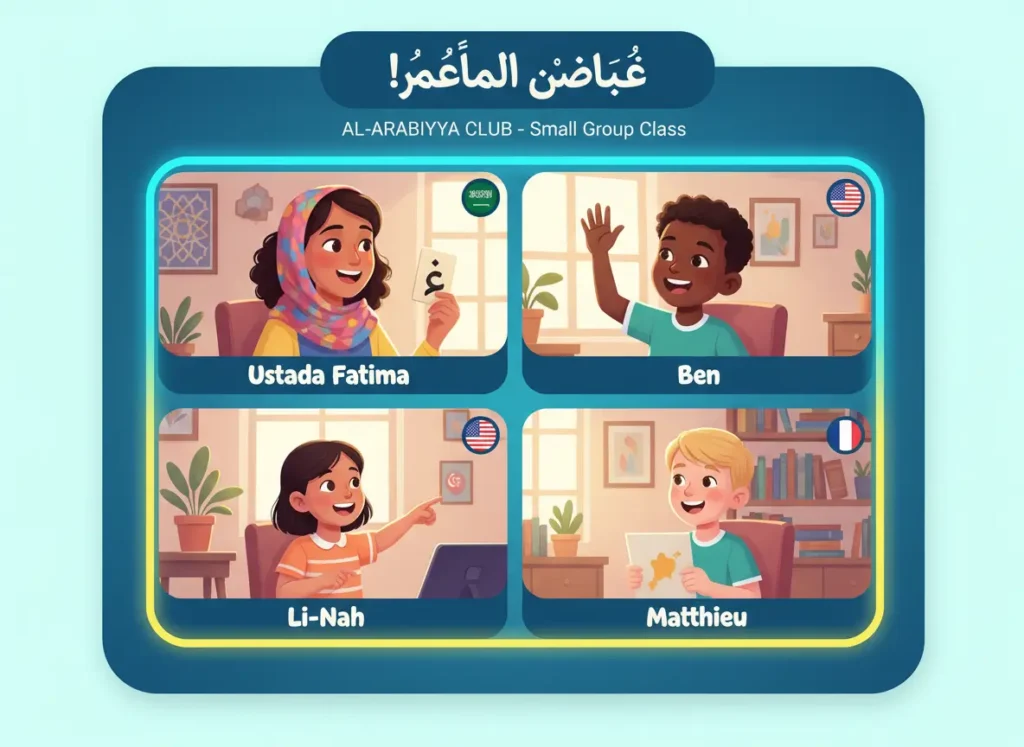
Technology and materials matter, but nothing replaces an excellent teacher. Research consistently demonstrates that teacher quality is the single most important in-school factor affecting student achievement (Hattie, 2009).
What Defines a Qualified Children’s Arabic Teacher?
1. Native or Near-Native Arabic Proficiency
Why It Matters: Children’s phonological development depends on native-speaker models. Arabic contains sounds (ع، ح، خ، غ، ص، ض، ط، ظ، ق) absent from most languages. Only native speakers reliably produce these sounds correctly, providing the auditory models children need to develop native-like pronunciation.
2. Specialized Training in Child Development and Pedagogy
Why It Matters: Knowing Arabic and teaching Arabic to children are entirely different skills. Effective teachers understand:
- Developmental Stages: What 5-year-olds can realistically achieve vs. 12-year-olds
- Age-Appropriate Pedagogy: Play-based learning for young children vs. analytical approaches for adolescents
- Classroom Management: Maintaining engagement and positive behavior
- Differentiated Instruction: Adapting to diverse learning needs and styles
3. Cultural Competence and Sensitivity
Why It Matters: Language and culture are inseparable. Excellent teachers:
- Integrate cultural content naturally (holidays, customs, values)
- Respect diverse cultural backgrounds (Arab and non-Arab students)
- Build cultural pride and positive identity associations
- Address sensitive topics age-appropriately
4. Patience, Enthusiasm, and Child-Centered Mindset
Why It Matters: Children’s motivation depends heavily on teacher-student relationship quality. Research demonstrates that teacher enthusiasm and warmth directly impact student engagement and achievement (Frenzel et al., 2009).
For guidance on finding qualified teachers, explore resources on Arabic Teacher Online for Kids and Arabic Tutor for Kids Online.
Making Arabic Learning Fun: The Critical Role of Games and Engagement
“Play is the work of childhood” (Rogers, 1988). For children, play isn’t frivolous—it’s how they learn most effectively. Integrating games and playful activities into Arabic instruction isn’t optional; it’s pedagogically essential.
Why Games Work: The Neuroscience of Playful Learning
Dopamine and Motivation: Play triggers dopamine release—the neurotransmitter associated with pleasure and motivation (Schultz, 2007). Children playing Arabic games experience neurochemical rewards, creating positive associations with language learning.
Reduced Cognitive Load: Games lower “affective filter” (Krashen, 1982)—the psychological barriers inhibiting language acquisition. When children focus on winning a game, they stop overthinking grammar, allowing natural acquisition processes to function.
Contextualized Learning: Games provide meaningful contexts for language use. “I need the red card” (أحتاج البطاقة الحمراء) has purpose and meaning in a game, facilitating deeper processing and retention than decontextualized drill.
Repetition Without Boredom: Language acquisition requires massive repetition. Games make repetition enjoyable—children happily play the same game repeatedly, accumulating the practice necessary for mastery.
Types of Arabic Learning Games for Children
Physical Games (TPR-Based):
- Simon Says (Arabic): “Yaqul ‘Ali” teaching action verbs and imperative forms
- Treasure Hunt: Following Arabic clues to find hidden objects
- Musical Chairs with Arabic Songs: Combining movement, music, and listening comprehension
Board and Card Games:
- Arabic Memory/Concentration: Matching Arabic words with pictures
- Bingo: Numbers, colors, animals in Arabic
- Snakes and Ladders: Answering Arabic questions to advance
Digital Games:
- Vocabulary Building Apps: Gamified flashcards with spaced repetition
- Story-Based Adventure Games: Navigating virtual worlds requiring Arabic comprehension
- Pronunciation Practice Games: Speech recognition providing instant feedback
Role-Playing Games:
- Restaurant: Taking orders, serving food, paying bills (all in Arabic)
- Market: Buying and selling fruits, vegetables (practicing numbers and negotiations)
- Family: Pretend play using family vocabulary and household routines
For comprehensive fun learning approaches, see Fun Arabic Lessons for Children, Fun Learning & Games, and Kids Arabic Lessons & Activities.
Integrating Technology While Preserving Authentic Connection
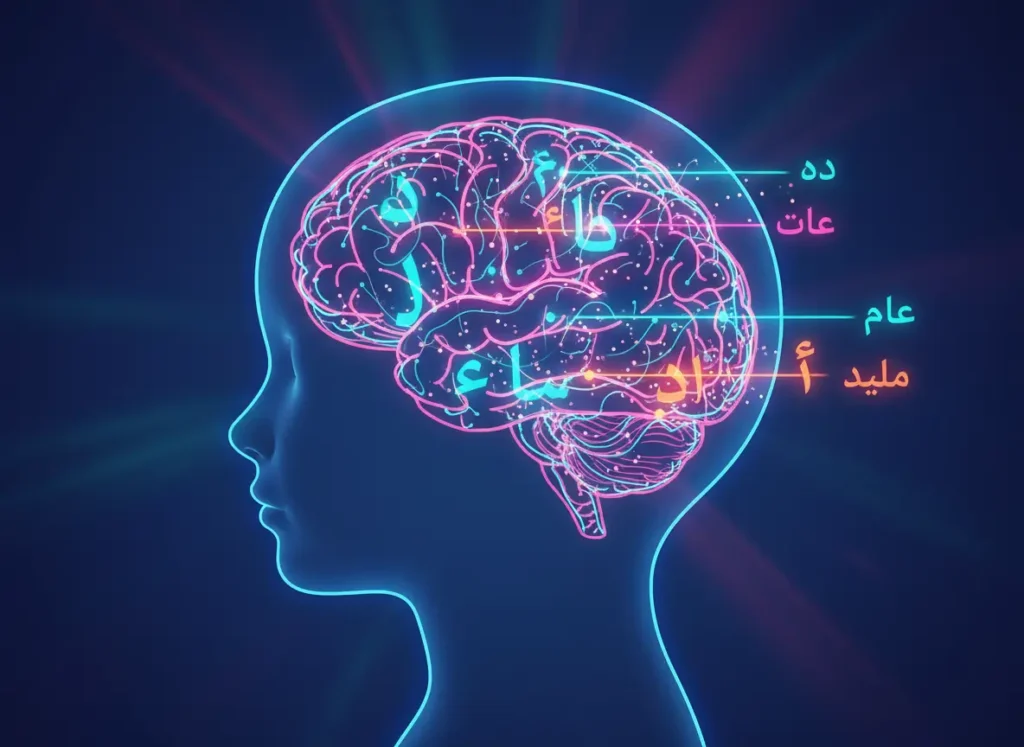
The digital age presents unprecedented opportunities—and risks—for children’s Arabic education. Research-informed integration balances technological affordances with irreplaceable human elements.
Technology’s Proven Benefits
Adaptive Learning Platforms: AI-powered systems adjust difficulty based on student performance, providing personalized learning paths impossible in traditional one-size-fits-all instruction (VanLehn, 2011).
Immediate Feedback: Digital tools provide instant correction—crucial for pronunciation and spelling development. Children make an error, receive immediate feedback, and correct course before habits solidify.
Engaging Multimedia: Combining animation, sound, and interactivity leverages multiple learning modalities, accommodating diverse learning styles (Mayer, 2009).
Accessibility: Online Arabic classes eliminate geographic barriers. A child in rural Texas accesses the same qualified Egyptian or Lebanese teachers as someone in Cairo or Beirut.
Technology’s Limitations
Screen Time Concerns: The American Academy of Pediatrics (2016) recommends limiting screen time for children. Arabic learning via screens must balance educational value against health concerns (eye strain, sedentary behavior, sleep disruption).
Lack of Authentic Interaction: Apps cannot replicate the richness of human interaction—the responsive dialogue, the emotional connection, the cultural transmission occurring between teacher and child. Technology supplements; it cannot replace.
Over-Reliance Risk: Children accustomed to gamified apps may struggle with non-digital Arabic contexts (books, conversations). Balanced integration prevents technology dependence.
The Optimal Integration Model
Blended Learning: Combining live online instruction with qualified teachers (2-3x weekly) with supplementary app-based practice creates optimal results. Teachers provide human connection, cultural context, and responsive feedback. Apps provide additional practice and engagement between sessions.
Developmentally Appropriate Screen Time:
- Ages 3-5: Maximum 30 minutes daily Arabic screen time, preferably co-viewing with parents
- Ages 6-10: 45-60 minutes daily, balanced with physical activities and reading
- Ages 11-16: 60-90 minutes daily, with metacognitive reflection on learning
Success Stories: Real Children, Real Transformations
Yusuf: From Zero Arabic to Bilingual Confidence
Background: Yusuf, age 6, Egyptian-American, parents wanted him to maintain Arabic but local options were limited.
Challenge: No Arabic at home (parents spoke English), no Arabic speakers in school, overwhelmed local masjid classes (20+ kids, one teacher).
Solution: Enrolled in online Arabic program with native Egyptian teacher (3x weekly), supplemented with Arabic children’s shows and games.
Timeline and Results:
Months 1-6:
- Learned Arabic alphabet through songs and games
- Built vocabulary of 200+ words (family, food, colors, animals)
- Began simple conversations (“What’s your name?” “I like…”)
- Most importantly: developed love for Arabic through playful, pressure-free approach
Months 7-12:
- Reading simple Arabic stories
- Writing basic words and sentences
- Vocabulary expanded to 600+ words
- Could describe daily activities and tell simple stories in Arabic
Months 13-24:
- Conversational fluency in daily topics
- Reading children’s books independently
- Writing short compositions
- Strong accent approaching native-like due to early start
Current Status (Age 9): Yusuf switches fluidly between English and Arabic. He reads Arabic children’s novels, watches Arabic cartoons without subtitles, and converses confidently with relatives in Egypt via video calls. His parents report he’s proud of his bilingualism and uses Arabic as marker of his Egyptian identity.
Key Success Factors:
- Early start (age 6 – within critical period)
- Qualified native-speaking teacher with children’s pedagogy training
- Playful, engaging approach preventing burnout
- Consistent practice (3x weekly + daily exposure through media)
- Parental support and positive reinforcement
Amira: Heritage Language Reclamation
Background: Amira, age 12, Syrian-Canadian, grandparents spoke Arabic but parents primarily used English. Felt disconnected from heritage.
Challenge: Older start (past optimal window for native-like phonology), self-conscious about making mistakes, skeptical about “kid stuff.”
Solution: Online program specifically designed for heritage speakers with adolescent-appropriate materials (Arabic music, social media content, cultural discussions).
Timeline and Results:
Months 1-6:
- Overcame initial resistance through culturally relevant content (Arabic songs she chose, discussions about Arab social media influencers)
- Developed functional reading and writing skills
- Began understanding conversations when visiting Syrian relatives
Months 7-18:
- Conversational competence in family contexts
- Reading Arabic news and social media
- Writing in Arabic on social platforms
- Strong accent (due to older start) but confident and functional
Current Status (Age 14): Amira identifies strongly as Syrian-Canadian. She texts cousins in Syria using Arabic, follows Arabic fashion influencers, and teaches younger siblings Arabic phrases. Her relationship with grandparents deepened dramatically—she now understands their stories and can communicate meaningfully.
Key Success Factors:
- Culturally relevant, age-appropriate materials
- Heritage language focus (not generic Arabic)
- Teacher understanding adolescent psychology
- Identity affirmation integrated throughout
- Connection to real-world use (family communication)
Noah: Non-Arab Muslim’s Quranic Journey
Background: Noah, age 8, African-American Muslim family, wanted to learn Arabic to understand Quran and pray with comprehension.
Challenge: No cultural connection to Arab world, needed both Quranic Arabic and Modern Standard Arabic, required Islamic cultural context.
Solution: Online program integrating conversational Arabic with Quranic vocabulary, Islamic cultural education, and age-appropriate Islamic values.
Timeline and Results:
Months 1-12:
- Learned Arabic alphabet through Islamic context (letters in Quranic words)
- Built foundation in conversational Arabic while prioritizing Quranic vocabulary
- Began understanding Quran recitation in Salah
Months 13-24:
- Reading Quran with basic comprehension of high-frequency words
- Conversational competence in Islamic contexts (masjid, Islamic school)
- Understanding 40-50% of common Quranic verses without translation
Current Status (Age 10): Noah reads Quran understanding many words directly. His Salah transformed—he comprehends what he’s reciting. He’s beginning to study Tafseer with age-appropriate materials. Arabic became his gateway to deeper Islamic knowledge.
Key Success Factors:
- Islamic context integration throughout
- Quranic vocabulary prioritization
- Teachers with Islamic knowledge (not just Arabic skills)
- Connection to spiritual goals (prayer comprehension)
- Family support (parents learning alongside)
Comprehensive Resources for Children’s Arabic Learning
Teacher-Led Instruction
Arabic Teacher Online for Kids: One-on-one or small group instruction with qualified native speakers specializing in children’s education. Personalized pacing, immediate feedback, human connection.
Arabic Tutor for Kids Online: Intensive individualized instruction for children needing extra support or accelerated learning. Focus on specific goals (literacy, conversation, Quranic Arabic).
Engaging Learning Approaches
Fun Arabic Lessons for Children: Structured curriculum incorporating games, songs, stories, and interactive activities. Learning disguised as play.
Fun Learning & Games: Dedicated programs using gamification, competitions, rewards systems to maintain motivation and engagement.
Kids Arabic Lessons & Activities: Comprehensive programs combining live instruction with offline activities (crafts, cooking, cultural projects) reinforcing learning.
Research-Backed Strategies for Parents Supporting Arabic Learning
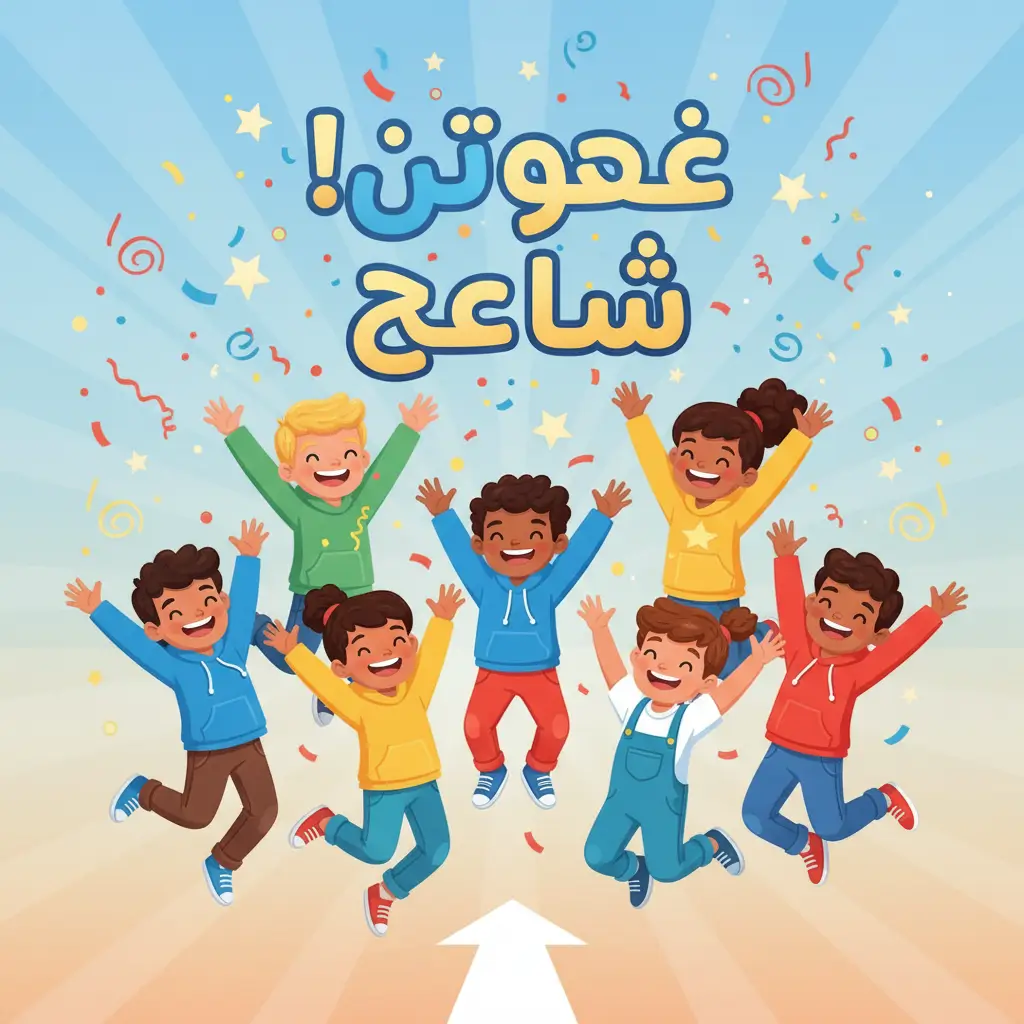
Parents are children’s first and most important teachers. Research demonstrates that parental involvement significantly impacts language learning outcomes (Desforges & Abouchaar, 2003).
Strategy 1: Creating Arabic-Rich Home Environment
The Research: Language acquisition requires massive input—thousands of hours of exposure. Children learning Arabic 3 hours weekly in class receive ~150 hours annually. Compare to ~5,000+ hours native speakers receive. Bridging this gap requires home immersion.
Implementation:
- Arabic Media: Cartoons, songs, YouTube channels in Arabic daily
- Labeling: Post Arabic labels on household objects (refrigerator – ثلاجة, door – باب)
- Bilingual Books: Reading Arabic picture books together (even if parents aren’t fluent)
- Arabic Playtime: Incorporating Arabic into play (dolls speak Arabic, building blocks have Arabic letters)
Strategy 2: Positive Associations and Pressure-Free Learning
The Research: Affective factors profoundly impact language acquisition (Gardner & Lambert, 1972). Anxiety, pressure, and negative associations create psychological barriers preventing learning.
Implementation:
- Celebrate Effort Over Perfection: Praise attempts, not just correct answers
- No Forced Performance: Don’t demand children “say something in Arabic” for relatives
- Cultural Pride: Associate Arabic with positive identity (heritage, religion, intelligence)
- Fun First: Prioritize enjoyment over academic achievement (especially for younger children)
Strategy 3: Consistent Schedule and Realistic Expectations
The Research: Distributed practice (spreading learning over time) surpasses massed practice (cramming) for long-term retention (Cepeda et al., 2006). Consistency matters more than intensity.
Implementation:
- Scheduled Classes: Same days/times weekly (treats learning as priority)
- Daily Mini-Practice: 15-20 minutes daily beats 2 hours on weekends
- Long-Term Mindset: Language acquisition takes years, not months
- Age-Appropriate Goals: Don’t expect 5-year-old fluency; appreciate developmental progress
Strategy 4: Authentic Communication Opportunities
The Research: Functional communication use accelerates acquisition more than decontextualized study (Long, 1996).
Implementation:
- Arabic-Speaking Friends/Community: Playdates, masjid, cultural events
- Family in Arab Countries: Video calls with Arabic-speaking relatives
- Arabic Pen Pals: Letter/email exchange with children abroad
- Travel: Visiting Arab countries when possible (immersion experience)
Frequently Asked Questions
At what age should children start learning Arabic?
Research suggests optimal windows: Ages 3-7 for phonological development (native-like accent), before puberty for morphosyntactic acquisition (intuitive grammar). However, children benefit at any age. Earlier start = higher ultimate attainment, but motivation and quality instruction matter more than age alone.
How long until my child is fluent?
“Fluency” varies by definition. Basic conversational competence: 2-3 years with consistent study (3-4 hours weekly). Advanced fluency (reading literature, academic discussion): 5-7+ years. Compare to native speakers receiving 10,000+ hours exposure by age 6. Realistic expectations prevent discouragement.
Should my child learn Fusha (MSA) or dialect?
Depends on goals. Quranic understanding, academic reading: Fusha essential. Family communication: Heritage dialect. Optimal approach for young children: Spoken dialect foundation (more natural for kids) with gradual Fusha introduction (ages 8-10) for literacy. Bilingual dialect/Fusha competence is achievable.
My child resists Arabic classes. What should I do?
Resistance often signals wrong approach, not lack of ability. Solutions: More engaging teacher, more games and less drills, cultural content matching child’s interests (sports, music, social media), lower pressure/higher fun, shorter more frequent sessions. Never force—creates negative associations.
Can my child learn Arabic online as effectively as in-person?
Research shows no significant difference when online instruction is high-quality (one-on-one or small group, qualified teachers, interactive methods). Online advantages: access to best teachers regardless of location, comfortable home environment, easier parental monitoring. Key is qualified teachers and engagement, not format.
How much should quality children’s Arabic programs cost?
Fair market rates : One-on-one online $20-35/session (45-60 min), small group $12-20/student/session, comprehensive programs with materials $150-300/month. Very cheap options often indicate unqualified teachers. Children’s education is investment—quality matters more than cost.
Why Choose Alphabet Arabic Academy for Your Child’s Arabic Journey
At Alphabet Arabic Academy, we don’t just teach Arabic to children—we ignite lifelong love for language, culture, and learning.
What Makes Our Children’s Programs Different
✅ Native Arabic Speakers with Specialized Children’s Training Every teacher is a native speaker (Egyptian, Lebanese, Syrian, Palestinian) with formal training in child development and language pedagogy—not just Arabic knowledge.
✅ Research-Based Curriculum Aligned with Developmental Stages Our programs integrate findings from second language acquisition research, child psychology, and pedagogical best practices—not random activities.
✅ Age-Specific Approaches (Not One-Size-Fits-All) 3-5 year-olds learn through play and TPR. 6-10 year-olds through games and stories. 11-16 year-olds through cultural content and real-world tasks. Each age group receives developmentally appropriate instruction.
✅ Perfect Balance: Fun AND Learning We gamify without sacrificing educational rigor. Children have blast while achieving measurable progress. Parents see both enthusiasm and results.
✅ Small Groups or One-on-One (Maximum Attention) Classes capped at 4-5 students maximum. Or one-on-one for individualized pacing. Every child receives personal attention impossible in large classrooms.
✅ Comprehensive Resources: Live Classes + Activities + Games Not just video calls. We provide offline activities, Arabic games, cultural projects, parent guides—complete ecosystem supporting learning.
✅ Flexible Scheduling for Busy Families Classes available across all time zones, 7 days a week. Morning, afternoon, evening—find times that work for YOUR family.
✅ Proven Track Record with Hundreds of Children From complete beginners to heritage speakers, from 3-year-olds to teenagers—we’ve guided hundreds of children to Arabic proficiency and cultural pride.
Your Next Steps: Give Your Child the Gift of Arabic
Every bilingual child started as a monolingual beginner. Every fluent speaker had a first day of class. Every confident reader struggled with first letters.
The difference between children who achieve Arabic proficiency and those who don’t often comes down to one decision: the decision to start with the right program.
How to Begin
Step 1: Define Your Goals Why do you want your child to learn Arabic? Heritage connection? Quranic understanding? Cognitive benefits? Cultural knowledge? Clear goals guide program selection.
Step 2: Assess Your Child Age? Current Arabic level? Learning style? Interests? Personality? Understanding your child ensures proper placement and approach.
Step 3: Research Programs Look for qualified native-speaking teachers with children’s training, developmentally appropriate methods, and proven track records.
Step 4: Try Before Committing Most quality programs offer trial classes. Your child’s engagement and comfort during trial predict long-term success.
Step 5: Create Support System Schedule consistent class times. Create Arabic-rich home environment. Connect with other Arabic-learning families. Parental support determines outcomes.
Step 6: Start Today Not next month. Not next year. Today. Your child’s Arabic journey begins with that first decision.
Conclusion: The Gift That Lasts a Lifetime
When Layla learned Arabic, she didn’t just acquire vocabulary and grammar. She gained access to her grandmother’s world—the stories, the laughter, the love that had been locked behind a language barrier.
When Yusuf became bilingual, he didn’t just develop cognitive advantages. He built an identity bridge connecting his American present with his Egyptian heritage.
When Noah understood Quranic Arabic, his prayers transformed from sounds to meanings—from ritual to spiritual connection.
This is what Arabic for kids really means. It’s not just an academic subject or extracurricular activity. It’s identity, cognition, heritage, spirituality, and family connection woven together.
The research is clear: Children who learn Arabic gain measurable cognitive advantages, deeper cultural roots, enhanced career prospects, and enriched family relationships.
The path is clear: Qualified native-speaking teachers, developmentally appropriate methods, engaging materials, consistent practice, and parental support.
The time is clear: Now. Today. This moment.
At Alphabet Arabic Academy, we’ve dedicated ourselves to making Arabic learning joyful, effective, and transformative for children. Our research-backed programs, qualified teachers, and proven methods have helped hundreds of children achieve Arabic proficiency while loving every step of the journey.
👉 Book your child’s free trial Arabic class with Alphabet Arabic Academy and begin a journey that will enrich their entire life.
“تعلّم لغة ثانية يعني امتلاك روح ثانية”
“To learn a second language is to possess a second soul.” – Charlemagne
Your child’s second soul awaits in the Arabic language.
The journey begins today.
بسم الله – In the name of Allah.
This guide synthesizes current research in second language acquisition, developmental psychology, and pedagogical best practices to provide evidence-based guidance for children’s Arabic education. Every child can learn Arabic with qualified teaching, appropriate methods, and family support. The gift you give your child today becomes the heritage they carry for life.

